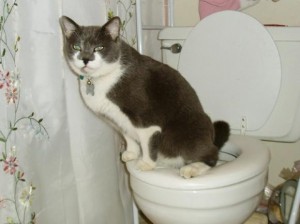Prevent Bathroom Disasters: Don't Flush Cat Poop Down Your Toilet - Expert Guidance
Prevent Bathroom Disasters: Don't Flush Cat Poop Down Your Toilet - Expert Guidance
Blog Article
This article in the next paragraphs about Can You Flush Cat Poo or Litter Down the Toilet? is amazingly fascinating. Check it out yourself and see what you think about it.

Intro
As pet cat owners, it's essential to bear in mind exactly how we dispose of our feline pals' waste. While it may seem hassle-free to purge cat poop down the toilet, this practice can have detrimental effects for both the environment and human wellness.
Environmental Impact
Flushing cat poop presents unsafe virus and bloodsuckers right into the water system, positioning a significant threat to water ecological communities. These contaminants can negatively influence aquatic life and compromise water high quality.
Wellness Risks
In addition to ecological worries, flushing pet cat waste can likewise present wellness dangers to humans. Feline feces might include Toxoplasma gondii, a bloodsucker that can trigger toxoplasmosis-- a possibly serious illness, especially for expectant women and individuals with damaged body immune systems.
Alternatives to Flushing
Luckily, there are safer and extra liable methods to deal with feline poop. Take into consideration the following choices:
1. Scoop and Dispose in Trash
The most typical approach of taking care of cat poop is to scoop it right into a biodegradable bag and toss it in the garbage. Make certain to make use of a specialized clutter scoop and dispose of the waste quickly.
2. Use Biodegradable Litter
Opt for naturally degradable feline trash made from products such as corn or wheat. These litters are environmentally friendly and can be securely taken care of in the trash.
3. Hide in the Yard
If you have a yard, consider burying feline waste in a designated area far from veggie yards and water sources. Be sure to dig deep sufficient to avoid contamination of groundwater.
4. Install a Pet Waste Disposal System
Purchase a family pet waste disposal system especially designed for pet cat waste. These systems utilize enzymes to break down the waste, lowering smell and ecological impact.
Verdict
Responsible family pet ownership expands beyond providing food and sanctuary-- it also involves correct waste administration. By refraining from purging feline poop down the commode and going with alternate disposal approaches, we can lessen our ecological footprint and protect human wellness.
Why You Should Never Flush Cat Poop Down the Toilet
A rose by any other name might smell as sweet, but not all poop is created equal. Toilets, and our sewage systems, are designed for human excrement, not animal waste. It might seem like it couldn’t hurt to toss cat feces into the loo, but it’s not a good idea to flush cat poop in the toilet.
First and foremost, assuming your cat uses a litter box, any waste is going to have litter on it. And even the smallest amount of litter can wreak havoc on plumbing.
Over time, small amounts build up, filling up your septic system. Most litter sold today is clumping; it is made from a type of clay that hardens when it gets wet. Ever tried to scrape old clumps from the bottom of a litter box? You know just how cement-hard it can get!
Now imagine just a small clump of that stuck in your pipes. A simple de-clogger like Drano isn’t going to cut it. And that means it’s going to cost you big time to fix it.
Parasitic Contamination
Believe it or not, your healthy kitty may be harboring a nasty parasite. Only cats excrete Toxoplasma in their feces. Yet it rarely causes serious health issues in the cats that are infected. Most people will be fine too if infected. Only pregnant women and people with compromised immune systems are at risk. (If you’ve ever heard how women who are expecting are excused from litter cleaning duty, Toxoplasma is why.)
But other animals may have a problem if infected with the parasite. And human water treatment systems aren’t designed to handle it. As a result, the systems don’t remove the parasite before discharging wastewater into local waterways. Fish, shellfish, and other marine life — otters in particular — are susceptible to toxoplasma. If exposed, most will end up with brain damage and many will die.
Depending on the species of fish, they may end up on someone’s fish hook and, ultimately on someone’s dinner plate. If that someone has a chronic illness, they’re at risk.
Skip the Toilet Training
We know there are folks out there who like to toilet train their cats. And we give them props, it takes a lot of work. But thanks to the toxoplasma, it’s not a good idea.

We were guided to that report about Don’t flush cat feces down the toilet from someone on our other web property. So long as you liked our blog entry plz do not forget to pass it around. Thanks a bunch for your time. Kindly stop by our blog back soon.
Schedule A Service Call Report this page